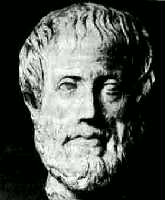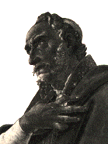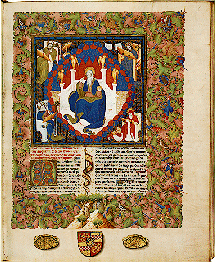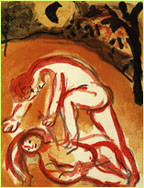Aristotle and Augustine |
||
|---|---|---|

|
There is a dichotomy of values in Beowulf: that of pride vs. humility. Beowulf is a man who boasts, yet he also has wisdom and humility. On the one hand Beowulf is reminded that pride will bring destruction: "until his portion of pride increases and flourishes within him; then the watcher sleeps, the souls guardian; that sleep is too sound, bound in its own cares" (5.9). Yet it is that very pride and boastfullness that help make Beowulf a heroic warrior capable of achieving the greatest of deeds. The concept of the tragic flaw of which Hrothgar warns Beowulf was first expounded by the Greek philosopher Aristotle, with Sophocles' Oedipus Rex as the ultimate example in Greek literature. However, as much as the Greeks spoke of the tragic flaw, there is still a strong sense of the heroic in their epic literature. Heroism and arrogance are to be admired as long as the hero does not strive too close to the gods and the heavens. It is not until well into the medieval period that Christianity reaches full bloom and the quality of heroic arrogance falls into disrepute. The Christian philosopher St. Augustine helped to turn man away from this earthly arrogance and the desire for material wealth and success. In Augustine's City of God, he attacks pagan culture and its pantheon of gods, blaming them for the decadence of society. It is Augustine's ideas that we see in Beowulf, tempering the heroic arrogance of the great warrior. |

|
| However wide the dichotomy of values may be, Beowulf appears to have achieved the difficult balance between pride and humility. For example, at the end of Further Celebration at Heorot Beowulf returns the sword Hrunting which turns out to be useless in his battle with Grendel's mother. But instead of taunting Unferth, Beowulf praises the sword: "...in his words he found no fault at all with the sword's edge; he was a thoughtful man" (11.3). Beowulf is a mix of two ideals: the heroic warrior of the pagans and the humble selfless servant of the Christians. | ||
 |
||
| Opening page of City of God manuscript | ||
Biblical Allusions in "Further Celebration at Heorot" |
||
|---|---|---|

|
There are several Biblical references in Beowulf that are quite interesting. Grendel is referred to as a descendant of Cain: "the hostile-hearted creature, Gods enemy, guilty of murder" (2.4). In addition, there is a reference to the Great Flood that took place in Genesis: "the origin of ancient strife, when the flood, rushing water, slew the race of giants they suffered terribly: that was a people alien to the Everlasting Lord. The Ruler made them a last payment through waters welling" (3.2). In this reference to the biblical flood, the author of Beowulf is suggesting that the sword's creators were descendants of those that caused God to bring on the flood perhaps even suggesting that they were descendants of Cain. However, earlier in the passage these same giants are referred to with reverence: "There came into the possession of the prince of the Danes, after the fall of devils, the work of wonder-smiths" (2.2). Once again there is a contrast between the pagan and Christian cultures, as the same "giants" are referred to with honor and contempt in succeeding paragraphs. |

|